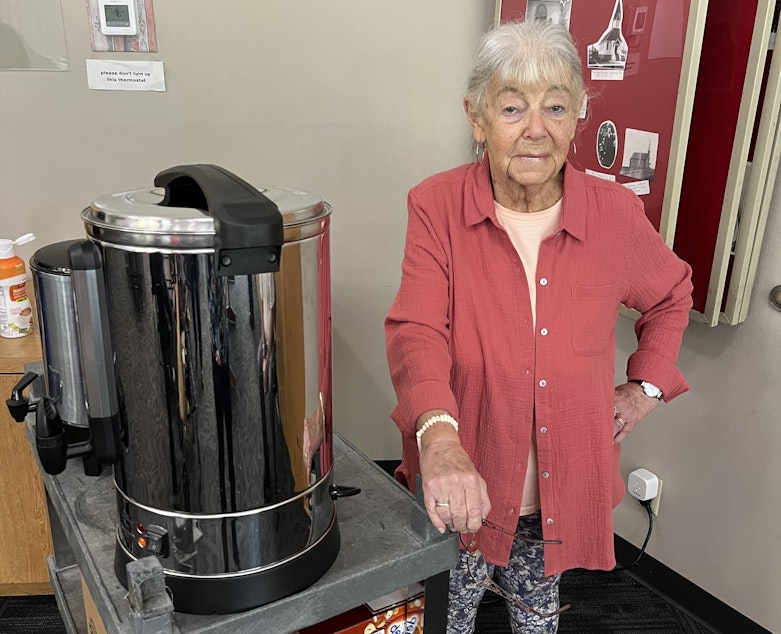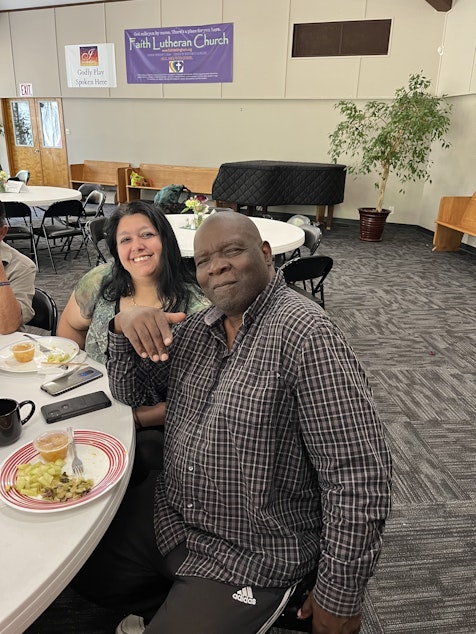'Everybody needs a friend.' This Bellingham grandma serves coffee and kindness to people in crisis

S
wing by the free lunch program called the Maple Alley Inn in Bellingham and a few things stand out: the fresh flowers on the tables and the hearty meals cooked from scratch using vegetables from a nearby garden, for instance.
Look a little closer and you’ll notice a group of guests clustered around a casual coffee cart in the corner of the dining hall. (The Maple Alley Inn is located inside the Faith Lutheran Church but is not religiously-affiliated.) The guests who come here include seniors, veterans, and families. And some of them struggle with housing, addiction, and/or mental health issues.
They’re gravitating toward 85 year-old Ursula DeWitt, a long-time volunteer who runs the coffee station.
DeWitt stands behind a rolling cart that holds a “100 cupper” coffee urn. Nearby is a selection of flavored creamers, sugar packets, various teas and hot cocoa packets. They’re small gestures that DeWitt hopes will add a little sweetness to the guests’ meals, and she buys them on her own dime.
The guests here seek out DeWitt because, for many of them, she feels like their favorite relative. She has an easy smile and is quick to laugh and to listen. She says several people have told her they wished she were their grandma.
Sponsored
RELATED: 'It's hard not to give up.' Homeless diaspora emerges as Washington cities lock down public spaces
“My motto is kindness, the word kindness,” DeWitt says. “These people just need some kindness in their life. They don't need to have people make fun of them. Or say bad things to them on the street.”

When DeWitt started volunteering here over 30 years ago, she says she was terrified at first, because she had no experience with working with vulnerable populations.
“I had never dealt with people that maybe had some mental problems, or were dragging a wet sleeping bag,” she says. “And then, as the years went by, I realized everybody needs a friend. And they were extremely nice people.”
Sponsored
One longtime guest, named Mike, loves chatting with DeWitt and asking her questions about Bellingham’s history.
“She’s amazing and I swear her memory is better than mine and I'm 10 years younger,” he says. “I just never tire of asking her questions about what Bellingham was like when there was no freeway, when there was no Costco and there was no mall. Right?! There were just these little shops and little grocery stores.”
Mike spent decades living on the street and in his van, although these days he lives in a hotel. He says chatting with DeWitt helped him feel less isolated – something he dealt with constantly on the street. Mike also credits his stabilizing relationship with DeWitt for helping him get sober more than 10 years ago.
Small acts of kindness can have a big impact on people who are struggling. That’s what April Ballard, a professor of environmental health at Georgia State University, says.
Sponsored
“Living outside, not being able to eat food, not being able to drink water — all of those things are going to negatively impact your physical health,” she says. “But then also, if you're not being treated like a person, if people aren't looking at you in the eyes, they're not asking what your name is, they're kind of ignoring you – that can really exacerbate everything that you're already going through.”
Ballard says a simple way to show someone dignity is to answer them if they ask you a question. For example, she says, imagine you're walking out of the grocery store and someone asks you for money. “Just looking at them and saying, ‘Hey, I can't right now,’ or ‘Hey, I don't have cash right now.’ And I think that that's okay. But just answer a person like you would at your job, when someone comes up to you and asks a question.”
Back at the coffee cart in Bellingham, DeWitt hands out cups of coffee. Like any good barista, she knows people’s preferred drinks and how many sugars they take.
DeWitt recently had a birthday on a day she was scheduled to volunteer. She says everyone asked her if she planned on skipping volunteering.
“Why would I do that?! These are my friends and I want to be with them.”
You can listen to Kyle's entire story here, followed by an interview with Assistant Professor of Environmental Health at Georgia State University, April Ballard:


